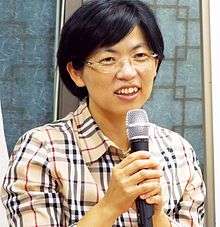Lee Jung-hee
Lee Jung-hee (Korean: 이정희; Hanja: 李正姬; born December 22, 1969) is a South Korean politician, lawyer and activist. 18th member of the National Assembly of South Korea. She was one of the candidates for the South Korean 2012 presidential election.
Lee Jung-hee | |
|---|---|
이정희 | |
 | |
| Unified Progressive Party candidate for President of South Korea | |
| Election date December 19, 2012 | |
| Opponent(s) | Park Geun-hye (Saenuri Party), Moon Jae-in (Democratic United Party) |
| Incumbent | Lee Myung-bak |
| Personal details | |
| Born | December 22, 1969 Seoul, South Korea |
| Political party | Unified Progressive Party |
| Spouse(s) | Shim Jae-hwan |
| Occupation | Politician, lawyer, activist |
| Korean name | |
| Hangul | |
| Hanja | |
| Revised Romanization | I Jeong-hui |
| McCune–Reischauer | Yi Chŏnghŭi |
Biography
Early years
Lee was born in Seoul in 1969. A graduate of Somun Women's High School and Seoul National University, she joined the student movement in 1992. During her early years, she was a human rights, workers' rights, and women's rights activist.
Political activities
In 2007 she joined the Democratic Labor Party (merged in 2011 with other parties to form the Unified Progressive Party). She was elected as a member of the National Assembly in 2008.[1]
In 2008 she was Vice Leader of Democratic Labor Party and next year was elected as the Democratic Labor Party's leader.
Lee Jung-hee was the UPP candidate for the 2012 presidential election. Hoping to damage the popular votes of the Conservative party candidate, she withdrew from the 2012 presidential election on Sunday, December 16, 2012. However, her action is viewed as it has brought the opposite aftermath; many conservatives people in South Korea, who were warned after watching her actively attacking the Conservative candidate on TV show - Lee openly stated that she is participating in the TV debate to "knock Park out of the election", participated more in election votes.[2]
She also drew criticism for her choice of word, referring to South Korea as "the Southern part" - a word rarely used in South Korea but often in North Korea.[3] Following heavy criticism, she withdrew the statement.
On September 2, 2013, Lee declared that she would go on hunger strike to protest what she called the “witch hunt” against UPP member Lee Seok-ki, whom the NIS has charged with planning armed rebellion against the South Korean government.[4] In a televised interview after the 2012 South Korean presidential election, she called the recently elected president Park Geun-hye the «first lady of the dictatorial era», and admitted that she ran as a contender in the elections mainly to castigate her opponent in the race.[5][6][7]
On December 19, 2014, Mrs. Lee was removed from all political activities with the Unified Progressive Party, and the party itself was removed from the Korean political scene, due to the unconstitutional nature of her party policies which deemed by the South Korean court as "pro-North Korean" Lee and other members of her party were removed and the party disbanded. Five members of the party were also members of the Parliament. It was the first time the constitutional court of Korea banned a political party since 1988. Lee Jung-hee criticized this move, stating this characterized a «dictatorial country».[8][9]
Books
- Love and Song and sick (2010)
- Future advances
- Learned woman
See also
- Sim Sang-jung
- Roh Hoe-chan
- Ma Kwang-soo
- Jin Joong-kwon
External links
- Unified Progressive Party (in Korean)
- Lee Jung-hee's Blog (in Korean)
- Lee Jung-hee (in Korean)
- http://www.koreaherald.com/view.php?ud=20141219000476
References
- 불가사의한 에너지, ‘초선의원 노무현’의 재림 Archived 2013-02-02 at Archive.today, SisaSeoul, 5 February 2010
- ‘노골적 反朴’ 이정희 되레 朴당선에 기여?, The Dong-a Ilbo, 20 December 2012
- "남쪽 정부" 이정희 대선 후보 고소당해, NEWSis, 10 December 2012
- Yoon, Min-sik. "UPP leader goes on hunger strike, protests 'witch hunt'". Korea Herald. Retrieved 2 September 2013.
- Chico Harlan (12 December 2012). "S. Korea's presidential contenders have near-opposite backgrounds". Washingtonpost.com.
- James M. Lindsay (25 February 2013). "Hello, Park Geun-hye: President of South Korea". Cfr.org.
- "Far left outsider "winner" in Korean presidential debate". Reuters. 2012-12-05. Retrieved 2020-05-12.
- "South Korea court bans 'pro-North' political party". Bbc.com. 19 December 2014.
- Choe Sang-Hun (19 December 2014). "South Korea Disbands Party Sympathetic to North". Nytimes.com.